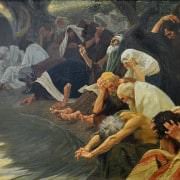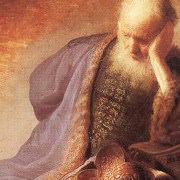The book of Lamentations
Once, a pastor went with a few friends to a bookshop and walked out with a commentary on Lamentations. “Lamentations!” his friends chuckled. You may even have a little chuckle to yourself when you realise you are reading Lamentations – well done! Most haven’t read it, ever.
The reading plan has done its best to be as chronological as history directs. Lamentations is taken as written by Jeremiah although it is strictly anonymous. Following the history up to this point you would have read the virtually endless pleas and warnings from God about pending trouble if the nation of Israel doesn’t change its ways of wickedness. Judah has managed to hold off an attack and exile longer than Israel. But time is up and in 587 B.C the horror of horrors befalls Jerusalem. Nebuchadnezzar and his powerful and utterly brutal Babylonians destroy the city. It takes time to destroy the once muscular walls, level the palaces and great houses, but most painfully they set the Temple on fire, destroying it and taking all its valuables and precious artefacts.
The people suffered too. All but the poorest of the poor are carried off to Babylon. This left Judah as a province of Babylon. Gedeliah, a Babylonian appointed governor, is killed a few months after being installed. Those left in Jerusalem (of which Jeremiah chose to be one) became increasingly scared and planned to flee to Egypt. Jeremiah tells them that God says he will protect them and they should stay, but they accuse Jeremiah of lying and he leaves with them to Egypt. Jerusalem and Judah was left battered and barren.
Lamentations is a poetic book recording the total despair felt at this time. It laments the city and the people’s fate. It acknowledges that their sin has been great and God did warn them. It deals with the emotion of finding out that behind the Babylonian destruction was not a powerful nation but their God himself.
The context of the letter makes it very readable and understandable. Keep in mind that you are reading picture-rich poetry. Here are the main ideas of each chapter:
Chapter 1 – Jerusalem is weeping and wailing. Sin is the cause and God is just in his actions. A plea for punishment of the enemy and restoring of Jerusalem.
Chapter 2 – A taking stock of the problem and the punishment. And acknowledgement that only the hand that dealt the blow can restore the nation again.
Chapter 3 – This chapter balances the awfulness of God’s judgment with the righteousness of his character. The people are urged to repent and return to God, hoping that Babylon would fall in the future.
Chapter 4 – The horror of the present is highlighted by showing the extent of the former glory of Jerusalem.
Chapter 5 – a prayer and appeal to the Lord to restore the fortunes of his people physically and their relationship with him as their God.
Pic: Gebhard Fugel


